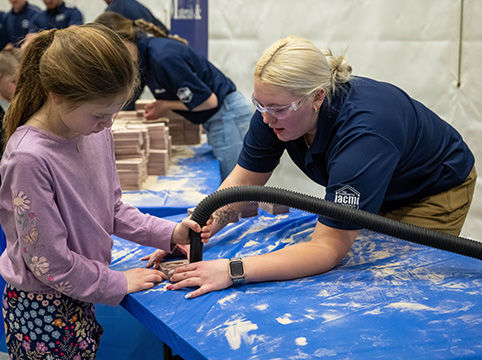The Institute for Advanced Composites Manufacturing Innovation (IACMI) and the Department of Defense are investing $4.4 million in metals-based workforce development programs at Penn State’s Behrend and University Park campuses.
The three-year initiative—the Metallurgical Engineering Trades Apprenticeship and Learning program, or METAL—is an effort to address a shortage of skilled labor in the manufacturing sector. Nearly one-fourth of the manufacturing workforce is aged 55 years or older, according to the U.S. Census Bureau. By 2030, more than two million manufacturing jobs will be unfilled, according to the Manufacturing Institute.
That lack of skilled workers is a concern for the Department of Defense, which relies heavily on cast and forged equipment. The department has identified a need for at least 122,000 mission-critical manufacturing personnel by 2028.
“The foundational building blocks for all manufacturing start with metal,” said Joannie Harmon, vice president of workforce development at IACMI. “Fostering development of an industrial-base workforce and ensuring the right skill sets are available—from skilled trades on the shop floor through doctoral-level engineering capabilities in a research setting—is vital to national security.”
Dr. Paul C. Lynch, associate professor of industrial engineering, leads the METAL program at Penn State. As a member of the project’s steering committee, he works with University colleagues to develop metals-focused manufacturing teaching programs, including:
- Workshops and outreach events for K-12 students
- Hands-on manufacturing “boot camps” for students 18 and older
- Certificate and apprenticeship programs
- An online curriculum in metal manufacturing
Dr. Mark Rubeo, an assistant professor of mechanical engineering at Behrend, is assisting with the metals-manufacturing teaching programs. He also is providing guidance on postprocessing techniques for castings and forgings and their effects on material microstructures and mechanical properties.
Two faculty members in the College of Engineering at University Park also are contributing to the effort. They are assisting with the teaching programs, with an emphasis on apprenticeship and potential certificate programs, and are developing digital manufacturing modules, including 3D sand-printing and AR/VR learning programs.
Researchers at the University of Tennessee are working collaboratively with the Penn State team, providing additional support. Jobs for the Future, a national nonprofit organization dedicated to creating career pathways for low-wage workers, is helping to develop the apprenticeship programs.
The METAL program directly supports Behrend’s Project RESOLVE, a ten-year regional effort to shift the metal manufacturing, plastics, and transportation industries to a circular economic model that reduces pollution in and near the region’s freshwater resources, including Lake Erie. A planned Center for Manufacturing Competitiveness will include labs for metal casting and additive manufacturing—an innovation “sandbox” where University researchers and industry partners can test new techniques.
“We want to inspire the next generation to pursue careers in metal manufacturing,” Lynch said. “The ultimate goal is to position the Pennsylvania metals industry to be competitive in both the national and international marketplaces, and to keep family-sustaining jobs in the United States, including here in the Erie region.”
Casting George Washington’s Sword
Each year, the Steel Founders’ Society of America (SFSA) challenges university students across the country to combine engineering skill with creative design in its annual Cast in Steel competition. Using modern casting techniques, student teams are tasked with recreating a historic or functional steel object.
This year, participants were asked to produce a fully functional replica of one of George Washington’s swords. The finished weapon had to be no more than 43 inches long and weigh less than 4.4 pounds.
Penn State Behrend’s Cast in Steel team shared the journey with a crew from Workaholic Productions, a documentary team that has partnered with National Geographic, the History Channel, and PBS. The crew followed the process of designing and casting the sword and traveled with the team to Atlanta for the national event.
